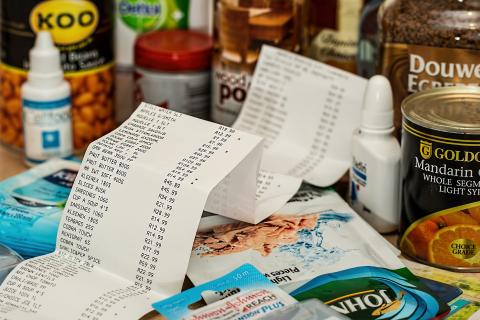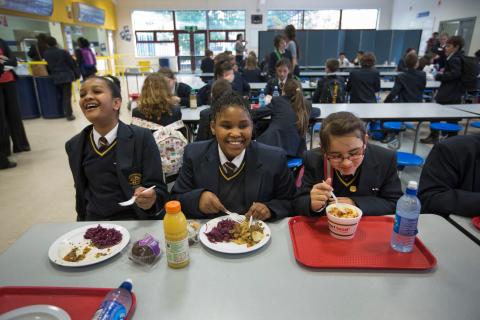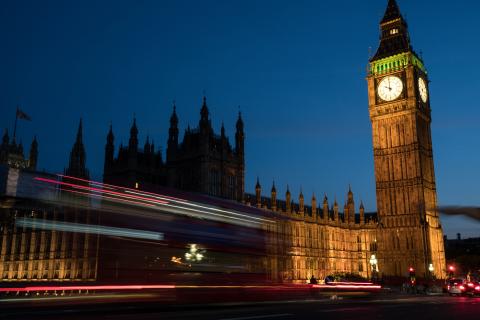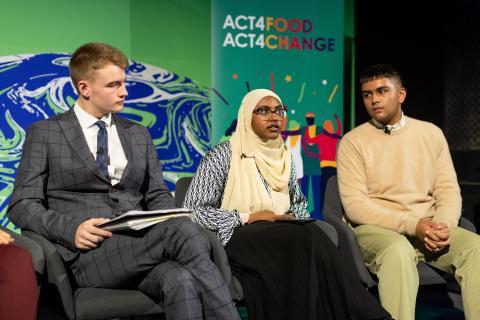14 March 2022
Is it Time to Enshrine our Right to Food?
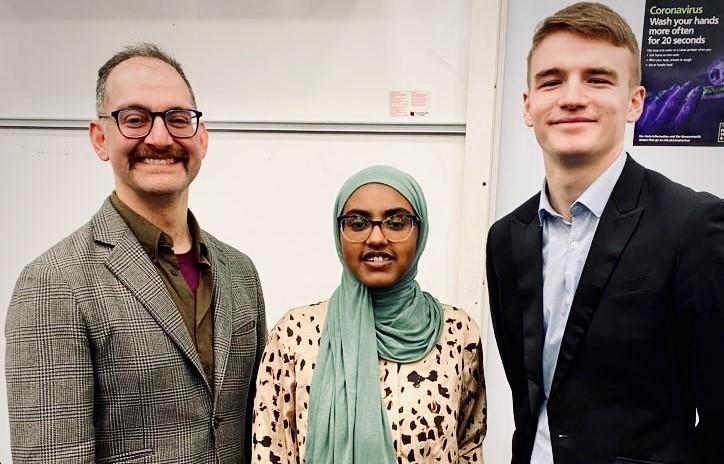
Is it Time to Enshrine our Right to Food? Our Young Food Ambassadors meet the UN’s Special Rapporteur on the Right to Food
In March 2020, Michael Fakhri was appointed by the Human Rights Council as the Special Rapporteur for the Right to Food – the stakes were high, given a global pandemic was sending both a public health and hunger crisis rippling across the world. During his first months in post, with little possibility of moving from his desk due to Covid restrictions, Michael came across the Children’s Right2Food Young Food Ambassadors through their videos posted online, in which they spoke out about exacerbated food insecurity, loss of free school meals during school closure, and the worries of food bills as family livelihoods were lost. These testimonials on the UK Covid food context fed into the first report of his tenure that, when published in June, laid bare the grave inequalities in diet and food access exacerbated by Covid-19.
So when the Ambassadors found out that Michael was coming to the University of Kent’s School of Law (visiting as part of his ‘day job’ as a professor in human rights and food law at the University of Oregon, USA) they leapt at the opportunity to meet him. Yumna, who is 17 and from Birmingham and Ryan, 20 from Glasgow, join Michael in front of an audience of campaigners, law students and the interested public, to exchange ideas on what the right to food could mean for the UK.
The Ambassadors introduce themselves to Michael and offer insight into why they were passionate about the right to food agenda. “I’m from Birmingham, where pre-pandemic, more than 1 in 3 young people suffered from food poverty, Yumna explains.
“The pandemic has been going on for two years and that number has increased. Food banks are supposed to be a short-term solution but now families are relying on them to feed their kids. I live in a food desert over-saturated by fast food. In my school at least 60% are reliant on Free School Meals. Young people in the UK don’t have access to healthy food, safe spaces, spaces to vocalise their concerns. We need agency. We need to talk about this range of issues.”
Ryan is keen to understand from Michael what his official role entails. “I’m mandated by the UN Human Rights Council to be an independent expert to monitor, report and promote the realisation of the right to food worldwide” Michael explains. Conversation leads to Michael’s own vision of what is meant by the right to food; “everyone should be able to access good food, they should decide for themselves as a community what this is; food should be available – whether through the shop, your relationship with the land and growing your own food, access to water, fishing and hunting. We produce more than enough food – the problem isn’t a lack of food – it’s a political failure. It’s a breakdown of institutions. What a human rights perspective means is that we focus on relationships between us, the government and each other, our relationship with the ecosystem. It’s about holding the government accountable. And it means the power always starts in the hands of the people and they tell the government how to govern.”
Youth participation in the rights-based food agenda
Michael is quick to applaud Yumna and Ryan on their campaigning successes, that range from raising awareness with Marcus Rashford on holiday hunger to speaking out about food and climate at COP. “You have not only brought your lived experience to the table, but you’ve transformed it into political power. What I wrote in my report about school closures – you taught me what was going on, and what needed to be done. Those are two very hard questions.” Yumna is keen to advocate for stronger youth participation in the rights-based food agenda. “I work with Birmingham local authority and I try and get more young people to be part of forums for them to vocalise their concerns in public health,” explains Yumna, “I can’t represent all young people; we’re so diverse, we come from such different backgrounds. If we aren’t listening to a wider group of young people, how do we expect our policies and practices to serve society?”
Michael resolutely agrees; “youth have the answers, they should be leading us not just participating. Youth is not a homogenous block – they are farmers, workers, students, migrants, people with disabilities. And they have the most to lose right now.”
The climate and food activism disconnect
Michael, Yumna and Ryan also exchange their views of the COP26 climate conference and Michael is keen on understanding from a youth perspective why campaigning on climate and sustainable food systems aren’t better connected. “It was hard to get food on the agenda,” Michael remembers. “When it comes to activism, climate change is a separate group to food activists, but we are asking the same questions.” Both Ryan and Yumna see the stigma of food poverty as a key barrier. “You don’t hear young people speaking about food because of the stigma attached to it; food poverty feels personal,” Ryan explains.
“I also campaign on climate justice issues,” Yumna adds, “but I understand the relevance of food. We’ve got to move away from individual blame and make people realise we need systemic change.”
What are the upcoming opportunities for food system change?
Ryan talks about two big political moments for change on the horizon but also recognises the risk of Government promises falling short. “We are waiting for the National Food Strategy White Paper – it’s overdue,” he explains. “Look how quickly emergency Covid measures were brought in – that was a public health crisis; but food poverty is a public health crisis too. We need action.” Turning his attention to Scotland, he adds: “I had high hopes for the Good Food Nation Bill – I’m am Ambassador for it – but currently there is no commitment from Ministers in Scotland to the right to food. That needs to be enshrined in Scots Law.” Michael also sees it important to get political structures in place for the right to food agenda to progress. “Institutional structures matter almost more than the words on paper - they turn words into action. It’s our commissions our youth councils – you are deciding how to give meaning to the right to food in a dynamic way that has accountability.”
Yumna makes clear her belief that young people's voices should be directly embedded within policymaking and governance at these key political moments. “After this pandemic, we need a healthier generation of young people. We are not going to get this unless we get proper implementation of recommendations in the National Food Strategy – we need good food policy at all the different layers of government, local and central. We need to put people before profit, help heal our planet and people’s health. We need regular consultation with young people.”
Michael adds his international perspective; “every country is in a food crisis, every country has an increased level of hunger and malnutrition and the rate of famine is increasing globally. Combined with this, Governments don’t work together – so I need to work internationally to rally government, civil society and social movements to respond multilaterally.”
The final and burning question from the Ambassadors is when we might see Michael back in the UK on an official visit – meaning when the Special Rapporteur would come on invitation by the UK Government to get an in-depth understanding of the UK context, to be followed up with an official report. “Glasgow is top of my list,” Michael humoured. “With Covid still making travel difficult, I can only say if not when. But I’ll make every effort to make it happen.”
For more on the Special Rapporteur's visit see here.
